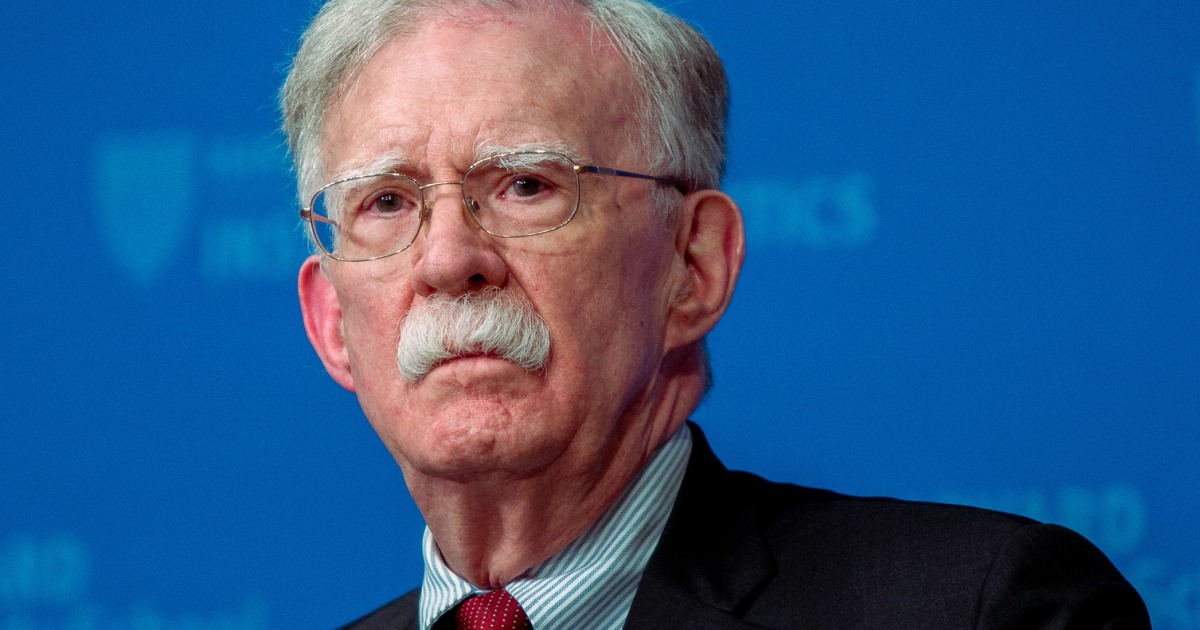
IT’S TOO EARLY TO EVALUATE THE MERITS of any case that may eventually arise against John Bolton.
It’s not too early, however, to talk about the FBI’s conduct on Friday in executing a search warrant at his house.
I say it’s too soon to judge Bolton, because there are—as yet—no charges against him to evaluate. We haven’t seen the warrant application that led to the search. And we don’t really even know what the FBI is investigating.
Many analysts presumed the warrant had something to do with Bolton’s 2020 book, which he released without completing the prepublication review process.
But Vice President JD Vance suggested that the investigation of Bolton that resulted in Friday morning’s search in Bethesda was not limited to such issues. Classified documents, he said, are part of the issue, but “there’s a broad concern here about Ambassador Bolton.”
That appears to be a reference to a different investigation, described by the New York Post over the weekend, as follows:
Federal agents raided Bolton’s Maryland home and DC office Friday morning in search of evidence in their case investigating the Trump critic’s alleged theft of “highly sensitive national security documents.”
The alleged crime was first identified in 2020 through a “very specific intelligence capacity” that helped produce damning intelligence that Bolton had “transferred” classified documents to his wife and daughter from his White House desk before Trump fired him in September 2019, the senior sources told The Post.
Investigators opened the case—entirely separate from a different investigation into Bolton’s alleged inclusion of national security secrets in his 2020 book, “The Room Where it Happened”—at the time, which carried into the Biden administration, but was “shelved,” officials said.
Far be it from me, in other words, to declare Bolton an innocent victim of Trumpian repression. The search was clearly authorized by a court. And therefore some FBI agent must have sworn out an affidavit persuasive enough that some magistrate judge approved it.
There are other reasons not to proclaim Bolton’s innocence with too high a degree of confidence. Back in 2020, U.S. District Judge Royce Lamberth, even in declining to enjoin publication of Bolton’s book, wrote that “the Court is persuaded that Defendant Bolton likely jeopardized national security by disclosing classified information in violation of his nondisclosure agreement obligations.” He also wrote: “Bolton has gambled with the national security of the United States. He has exposed his country to harm and himself to civil (and potentially criminal) liability.”
In short, perhaps Judge Lamberth is right and Bolton is, at long last, reaping what he sowed five years ago when he went ahead with his book without waiting for prepublication review to finish. Or perhaps Vance is telling the truth and Bolton is suspected of something else, as some FBI officials are clearly suggesting to the New York Post. Perhaps both are true.
On those questions, I will wait and see.
BUT OF ONE THING, I AM CERTAIN: The search of Bolton’s house was designed to send a message.
I know because I was there. For a while, I was the only one there. And even as I was there apparently alone, the New York Post was reporting that the raid was happening.
I was there early that morning. I had already had an encounter with Montgomery County police officers, who did not let me stay on the scene. So I had been circling the block for around an hour, keeping an eye on the situation, when things suddenly started happening. At 6:55 a.m., I texted a colleague that we had action; Montgomery County police cars were sealing off the block on which Bolton’s house stands. I snapped some pictures and took some video. I talked briefly to the Montgomery County police officers, who told me they were there in support of an FBI operation.
And then I started livestreaming. It was 7:05 a.m. when I texted my colleagues that I was going to start a livestream. Two minutes earlier, unbeknownst to me, FBI Director Kash Patel had all but publicly announced the raid:
At 7:14 a.m., nine minutes after I started my livestream, the New York Post tweeted out a story about the search. I looked around. I was still by myself. Yet somehow, a mere nineteen minutes after the police action began on that street in a D.C. suburb, the New York tabloid was reporting details of the operation overtly sourced to administration officials.
In other words, part of the point of the exercise was that people should know about it. Part of the point was to create a theatrical display of law-enforcement power deployed against a critic of the administration. When Vice President Vance was asked about this display a few hours later, he didn’t even bother to pretend that there was some wall of separation between the Justice Department’s investigative functions and the administration’s political brass. He talked about the investigation as though it were something perfectly natural for him to know about—as though vice presidents normally know about why former officials five years out of office are under investigation. That was part of the point of the exercise too—that the administration will offer only the thinnest of denials that it is gunning for its political enemies. And it will offer these denials with a smirk.
I have no particular brief for Bolton. Leaving aside our foreign policy differences, the man had an opportunity to behave like a patriot during Trump’s first impeachment by testifying before Congress, and he passed it up with an arrogance I find hard to forgive. As I say, it wouldn’t particularly surprise me if he turns out to have done something wrong either with respect to the book or with respect to some other national security materials.
But this kind of menace-messaging is not what law enforcement is for. It’s thug stuff—designed to intimidate not just Bolton but others too.
The message is that if you criticize Trump, the government is coming for you. It doesn’t matter if the last administration passed up prosecution (as happened here); Trump’s team will blame that on politicization and revive the matter. It doesn’t matter if the issue is old and stale and statutes of limitations are looming. It doesn’t matter if the incumbent president’s own mishandling of classified material radically outdoes your own and they have to twist themselves into pretzels to seem concerned about behavior that is a pale shadow of behavior we only recently dismissed.
The message is: You should know that we’re coming for you. And we’ll find whatever it is you may have done.
Whatever Bolton may have done was not really why the FBI was at his house on Friday.
Had this really been about Bolton’s conduct, Patel would not have been tweeting at 7:03 a.m. about nobody being above the law. A “Trump administration official” would not have been providing the New York Post information about the raid at the same time. Trump on Sunday would not have been suggesting that Chris Christie may be next for a raid. And the New York Post would not have run stories this weekend about how the raid had nothing to do with Bolton’s book but was about something else—sourced unsubtly to “high ranking FBI officials.”
I will judge Bolton when I see what allegations emerge from this investigation, if any, and when I can evaluate the evidence in support of those allegations.
But I don’t need to wait that long to judge the FBI’s conduct, which was brutish and ugly and unlike what I’m used to seeing from the modern bureau.
Source link



